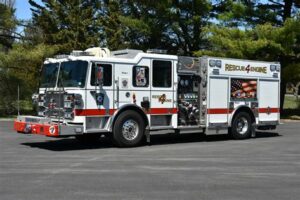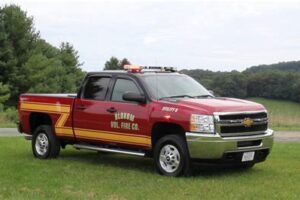Table of Contents
Volunteer fire stations play a crucial role in providing emergency services to communities. These selfless individuals dedicate their time and expertise to protect lives and property from fires and other emergencies. Discover the importance and impact of volunteer fire stations in safeguarding our neighborhoods and how you can support their noble cause.
Volunteer Fire Stations, with their selfless dedication and unwavering commitment, are the unsung heroes of our communities. These brave men and women rush into danger when everyone else is running away, fearlessly battling the flames that threaten our homes and lives. But what sets them apart from their professional counterparts is not just their courage, but their deep-rooted sense of community. In small towns and rural areas, where resources may be scarce, volunteer fire stations stand as beacons of hope, relying on the generosity and support of their neighbors to keep their engines running and their firefighters ready.
The Lifeline of Local Communities
A volunteer fire station is a crucial component of any local community. These stations are manned by brave individuals who dedicate their time and effort to protect their neighborhoods from the devastating effects of fires. In many areas, volunteer firefighters are the first responders in emergency situations, providing life-saving assistance until professional help arrives. Let’s take a closer look at the vital role and challenges faced by these selfless volunteers.
Unsung Heroes
Volunteer firefighters are the unsung heroes of our communities. They willingly put themselves in harm’s way to save lives and property, often without receiving any monetary compensation. These individuals undergo extensive training to ensure they can handle various emergency situations effectively. From fighting fires to providing medical aid, their dedication and selflessness are truly commendable.
Community-Based Operations
Unlike professional fire departments, volunteer fire stations rely heavily on community support. These stations are usually funded through donations, fundraisers, and grants. The equipment and resources needed to respond to emergencies are acquired through these means. This community-based approach helps foster a sense of ownership and responsibility among residents, as they actively participate in ensuring the safety of their neighborhoods.
Challenges and Limitations
While volunteer fire stations play a crucial role, they face several challenges and limitations. One significant hurdle is recruiting and retaining dedicated volunteers. With the demands of modern life, finding individuals willing to commit their time and energy can be challenging. Additionally, funding can sometimes be insufficient, resulting in limited access to state-of-the-art equipment and training opportunities, which can affect response times and effectiveness.
Training and Certification
Volunteer firefighters undergo rigorous training to ensure they are well-prepared for emergencies. From basic firefighting techniques to advanced rescue operations, these individuals receive comprehensive instruction. Additionally, they must obtain certifications and licenses to operate equipment and perform specific tasks. Ongoing training is essential to keep their skills sharp and up-to-date with the latest industry standards.
Emergency Response
In emergency situations, volunteer fire stations are often the first to arrive at the scene. These brave individuals face the immense pressure of saving lives and minimizing property damage. Their quick response and effective coordination with other emergency services can make a critical difference in the outcome of an incident. Whether it’s a residential fire, car accident, or medical emergency, these volunteers are always ready to lend a helping hand.
Community Education and Prevention
Volunteer fire stations also play a vital role in community education and prevention efforts. They conduct awareness campaigns, organize drills, and provide valuable information on fire safety and disaster preparedness. By educating residents about potential risks and preventive measures, these stations help reduce the occurrence of emergencies and empower communities to protect themselves.
Supporting Mental Well-being
Firefighters, both volunteer and professional, are exposed to traumatic incidents that can take a toll on their mental health. Volunteer fire stations understand the importance of supporting their members’ well-being. They provide resources for psychological support, offer counseling services, and foster a sense of camaraderie among their ranks. Taking care of their mental health ensures that firefighters can continue serving their communities effectively.
Recognizing Volunteer Firefighters
It is crucial to recognize and appreciate the invaluable contributions made by volunteer firefighters. Local communities can extend their gratitude through various means, such as public acknowledgments, awards, and events dedicated to these brave individuals. By highlighting their selfless acts, we inspire others to join this noble cause and ensure the continuity of volunteer fire stations.
A Call to Action
If you have ever considered giving back to your community, joining a volunteer fire station can be a rewarding experience. The opportunity to save lives, protect property, and make a significant difference is unparalleled. These stations are always in need of dedicated individuals willing to undergo training and commit their time to serve their fellow citizens. Together, let’s support and strengthen our local volunteer fire stations, the lifeline of our communities.
The Vital Role of Volunteer Fire Stations in Local Communities
Volunteer fire stations play a crucial role in ensuring the safety and well-being of local communities. These dedicated stations are often the first line of defense when emergencies strike, providing prompt response times and vital assistance to those in need. From fighting fires to responding to medical emergencies and natural disasters, these volunteers selflessly serve their communities, often at great personal risk.
The Challenges Faced by Volunteer Fire Stations
While volunteer fire stations are undeniably essential, they face numerous challenges that can hinder their effectiveness. Limited funding and resources, difficulty recruiting and retaining volunteers, and the need for constant training and skill development are just a few of the obstacles faced by these stations. Nonetheless, their resilience and unwavering commitment to serving their communities make them an invaluable asset.
The Training and Skill Requirements for Volunteer Fire Station Personnel
Volunteer firefighters undergo rigorous training to ensure they are well-prepared to handle a wide range of emergencies. From learning fire suppression techniques and rescue operations to acquiring medical training, these volunteers dedicate countless hours to honing their skills. Many volunteer fire stations also provide ongoing training programs to ensure their personnel stay up to date with the latest firefighting techniques and safety protocols.
Volunteer Fire Stations: A Strong Sense of Community
One distinguishing factor of volunteer fire stations is the sense of community they foster. They often serve as gathering places for locals to not only learn about fire safety but also build relationships with their neighbors. These stations provide educational programs, community events, and even disaster preparedness initiatives, further strengthening the bond between residents and the men and women who selflessly protect their lives and properties.
Volunteer Firefighters as Everyday Heroes
As courageous and dedicated individuals, volunteer firefighters are true heroes in their communities. Despite the risks involved, they willingly put their lives on the line to save others without expecting any financial compensation. Their selfless acts of bravery and commitment to public safety make them highly respected members of society.
The Economic Benefits of Volunteer Fire Stations
Aside from their primary role in emergency response, volunteer fire stations also bring economic benefits to their communities. Insurance rates can be significantly lower in areas that have a well-functioning fire station nearby due to reduced risks. Additionally, the presence of a volunteer fire station can attract residents and businesses to an area, further contributing to the local economy.
The Importance of Supporting Volunteer Fire Stations
Recognizing the importance of volunteer fire stations, it is crucial for communities and governments to provide adequate support. By allocating sufficient funding, offering incentives for volunteers, and promoting community involvement, these stations can continue to thrive and serve as invaluable assets in times of need. Collaboration between volunteer fire stations and their local governments is key to ensuring the provision of resources, training opportunities, and necessary equipment.
The Future of Volunteer Fire Stations
As communities evolve, so do the challenges faced by volunteer fire stations. To adapt and stay relevant, these stations must continuously strive to innovate and meet changing needs. This may include investing in new technologies, expanding specialized response capabilities, and actively engaging with the community to promote fire prevention and safety practices. By embracing change while preserving their core values, volunteer fire stations can continue their vital role in safeguarding communities for generations to come.
Volunteer fire stations play a crucial role in ensuring the safety and well-being of communities across the country. These dedicated individuals, who selflessly give their time and effort, serve as the backbone of firefighting services in many areas. From responding to emergency calls to conducting fire prevention programs, these volunteer firefighters demonstrate unwavering commitment to protecting lives and property.
1. Essential Community Service: Volunteer fire stations provide an essential service to their communities. They are often the first line of defense when it comes to tackling fires, providing medical assistance, and handling hazardous situations. Their rapid response and professional training are instrumental in minimizing potential damage and saving lives during emergencies. By volunteering their time, these individuals ensure that their community is well-protected and prepared for any eventuality.
2. Cost-Effective Solution: Volunteer fire stations offer a cost-effective solution to providing firefighting services in areas where budgets may be limited. Instead of relying solely on professional firefighters, who require salaries and benefits, communities can rely on the dedication and expertise of volunteers. This not only helps in reducing the financial burden on local authorities but also allows for the allocation of resources to other important areas of community development.
3. Strong Community Bond: The presence of volunteer fire stations fosters a strong sense of community and camaraderie among its members. These individuals come from diverse backgrounds and professions, united by their common goal of serving others. Through regular training sessions and joint operations, they build strong relationships and trust, which further enhances their ability to work cohesively during emergencies.
4. Fire Prevention and Education: Volunteer fire stations play a proactive role in educating the community about fire safety and prevention measures. They organize educational programs, conduct drills, and distribute informational materials to raise awareness about fire hazards and the importance of early detection. By empowering individuals with knowledge and skills, these stations contribute to a safer environment and a reduced risk of fire incidents.
5. Volunteerism and Personal Growth: Engaging in volunteer work at fire stations offers numerous personal benefits to individuals. It provides an opportunity for personal growth, as volunteers develop valuable skills such as teamwork, leadership, and problem-solving. Additionally, the satisfaction derived from helping others and making a positive impact on the community is immeasurable.
In conclusion, volunteer fire stations are an integral part of our society, providing vital services, promoting community spirit, and ensuring public safety. Their selflessness and commitment are truly commendable, and their contributions should be recognized and supported by all.
Thank you for taking the time to visit our blog and read about volunteer fire stations. We hope that you have gained a deeper understanding of the essential role these stations play in our communities. As we conclude this article, we would like to leave you with some final thoughts on the importance of supporting and appreciating our local volunteer firefighters.
Firstly, it is crucial to recognize the selflessness and dedication displayed by these brave individuals who volunteer their time to protect and serve their community. Without any monetary compensation, they choose to put themselves in harm’s way to ensure the safety of others. Their commitment to safeguarding lives and property deserves our utmost admiration and respect. By supporting volunteer fire stations, we are not only expressing gratitude for their efforts but also contributing to the well-being of our neighborhoods.
Furthermore, volunteer fire stations often face numerous challenges that require our support. These stations heavily rely on community donations and fundraisers to meet their operational expenses. From purchasing and maintaining equipment to providing ongoing training for firefighters, the financial burden can be overwhelming. By donating our time, resources, or even a small amount of money, we can help alleviate some of these pressures. Every contribution, no matter how big or small, makes a difference and ensures that these stations can continue to provide their vital services.
In addition to financial support, there are various other ways we can assist volunteer fire stations. One such way is by volunteering ourselves. Many stations offer training programs where community members can learn basic firefighting skills and become certified volunteers. By actively participating in these programs, we not only gain valuable knowledge but also provide much-needed assistance during emergency situations. Additionally, spreading awareness about the importance of volunteer fire stations and the need for community support through social media, word-of-mouth, or local events can go a long way in garnering further support.
In conclusion, volunteer fire stations are the backbone of our communities, providing critical services without expecting anything in return. It is our responsibility to acknowledge their sacrifices and lend a helping hand whenever possible. Whether through financial contributions, volunteering our time, or raising awareness, we can all play a part in ensuring the continued success and effectiveness of these invaluable institutions. Let us remember that by supporting our local volunteer fire stations, we are ultimately investing in the safety and well-being of our own neighborhoods.
Thank you once again for visiting our blog and for joining us in recognizing the importance of volunteer fire stations. Together, let us stand with these incredible individuals and show our appreciation for their unwavering commitment to keeping our communities safe.
.
People also ask about Volunteer Fire Stations:
What is a volunteer fire station?
A volunteer fire station is a fire department that operates with unpaid, non-professional firefighters. These individuals generously offer their time and expertise to serve and protect their local community.
How are volunteer fire stations different from regular fire stations?
Volunteer fire stations differ from regular fire stations primarily in terms of staffing. While regular fire stations have full-time, paid firefighters on duty around the clock, volunteer fire stations rely on the availability of unpaid volunteers who respond to emergencies when they occur.
Why do people choose to become volunteer firefighters?
Many individuals choose to become volunteer firefighters due to their strong commitment to public service and their desire to make a positive impact within their community. Additionally, volunteering as a firefighter allows them to gain valuable skills and training in firefighting and emergency response.
Are volunteer fire stations effective?
Yes, volunteer fire stations can be highly effective in responding to emergency situations. Although they may face challenges related to limited resources and availability, well-trained and dedicated volunteer firefighters can still provide prompt and professional assistance to those in need.
How can I support my local volunteer fire station?
There are several ways you can support your local volunteer fire station. You can consider becoming a volunteer firefighter yourself if you meet the requirements. Alternatively, you can donate funds or resources to help them acquire necessary equipment or provide much-needed training. Additionally, spreading awareness about their work and attending community events organized by the fire station can also show your support.






